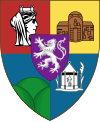Portal:European Union
Introduction
The European Union (EU) is a supranational political and economic union of 27 member states that are located primarily in Europe. The Union has a total area of 4,233,255 km2 (1,634,469 sq mi) and an estimated total population of over 448 million. The EU has often been described as a sui generis political entity (without precedent or comparison) combining the characteristics of both a federation and a confederation. Containing 5.8% of the world population in 2020, EU member states generated a nominal gross domestic product (GDP) of around US$16.6 trillion in 2022, constituting approximately one sixth of global nominal GDP. Additionally, all EU states except Bulgaria have a very high Human Development Index according to the United Nations Development Programme. Its cornerstone, the Customs Union, paved the way to establishing an internal single market based on standardised legal framework and legislation that applies in all member states in those matters, and only those matters, where the states have agreed to act as one. EU policies aim to ensure the free movement of people, goods, services and capital within the internal market; enact legislation in justice and home affairs; and maintain common policies on trade, agriculture, fisheries and regional development. Passport controls have been abolished for travel within the Schengen Area. The eurozone is a group composed of the 20 EU member states that have fully implemented the economic and monetary union and use the euro currency. Through the Common Foreign and Security Policy, the union has developed a role in external relations and defence. It maintains permanent diplomatic missions throughout the world and represents itself at the United Nations, the World Trade Organization, the G7 and the G20. Due to its global influence, the European Union has been described by some scholars as an emerging superpower. In 2012, the EU was awarded the Nobel Peace Prize. The United Kingdom became the only member state to leave the EU, in 2020; ten countries are aspiring or negotiating to join it. (Full article...) Selected article The eurozone, officially euro area, refers to a currency union among the European Union member states that have adopted the euro as their sole official currency. The Eurosystem, headed by the European Central Bank, is responsible for monetary policy within the Eurozone. The Eurozone has 19 members, with a further six states and territories using it as their sole currency. It circulates widely beyond that, and has started to serve as a reserve currency. Based on official estimates of 2007 GDP, the Eurozone is the largest economy in the world. Selected pictureThe Colosseum in Rome, Italy, at dusk. Although it is now in a severely ruined condition, the Colosseum has long been seen as an iconic symbol of Imperial Rome and is one of the finest surviving examples of Roman architecture.
Did you know?...that Monaco, San Marino, and Vatican City all mint their own euro coins, with their own national symbols on the back, despite not being EU members? Selected citySofia is the capital and largest city of the Republic of Bulgaria, with a population of 1,246,791, and some 1,377,761 in the metropolitan area, the Capital Municipality. It is located in western Bulgaria, at the foot of the mountain massif Vitosha, and is the administrative, cultural, and economic centre of the country. The history of Sofia dates back to the 8th century B.C, when Thracians established a settlement there. Sofia has had several names in the different periods of its existence, and remnants of the city's millenary history can still be seen today alongside modern landmarks. Sofia is one of the oldest capital cities in Europe, blending its past and present in a remarkable architectural style. Historic landmarks include the 10th-century Boyana Church, the Alexander Nevski Cathedral, and the early Byzantine Saint Sofia Church. More modern architecture is represented by the Bulgarian National Opera and Ballet, the Ivan Vazov National Theatre, the Rakovski Str theatre district, Slaveykov Square's outdoor book market, and the NDK. Sofia is the see of an Eastern Orthodox and of a Roman Catholic diocese. General imagesThe following are images from various European Union-related articles on Wikipedia.
TopicsFeatured contentFeatured articles
Featured lists
Featured contentGood articles
CategoriesRelated portalsAssociated WikimediaThe following Wikimedia Foundation sister projects provide more on this subject:
Discover Wikipedia using portals |
































































